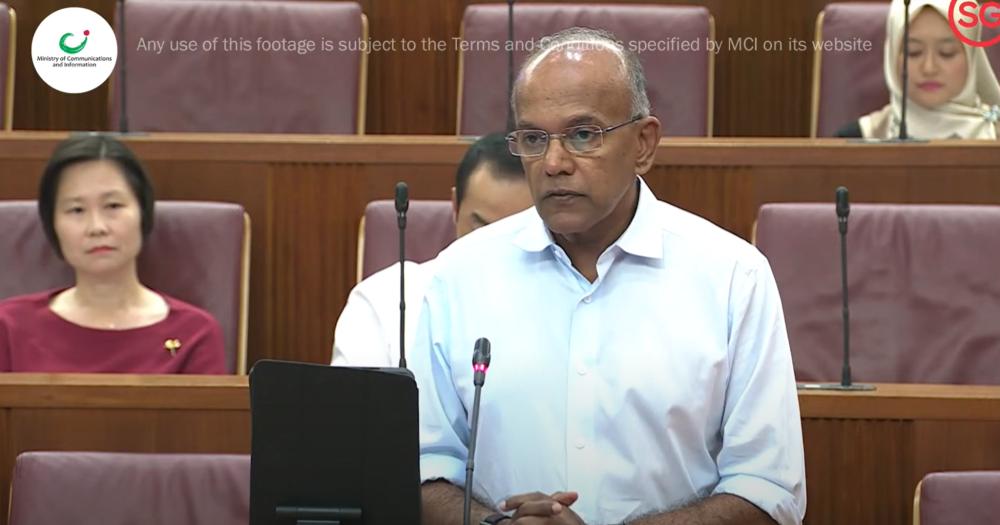On May 8, Minister for Home Affairs K. Shanmugam responded in Parliament to a question about a March 2024 social media post made by the Israeli Embassy in Singapore.
At the time, a religiously charged post was shared by the social media account of Israel’s embassy and was condemned as offensive by many, including Shanmugam himself.
The post was subsequently removed.
Member of Parliament Zhulkarnain Abdul Rahim asked Shanmugam if there had been any further action taken regarding the post, and whether a person responsible for posting on a foreign embassy's social media account enjoyed diplomatic immunity.
Emotionally charged tensions
Shanmugam explained that ongoing events and conflicts in the Middle East were especially emotionally charged, and caused significant tensions between people who identified with different sides of the conflict, both globally and in Singapore.
The police had received 43 reports in 2024 regarding alleged offensive remarks or actions targeted at either members of the Jewish or Muslim communities in Singapore.
Shanmugam warned that the government would intervene against such acts, which could affect Singapore’s social harmony.
He addressed the issue of protests in many places around the world, which often have a group with legitimate aims and want to be peaceful.
But often, others infiltrate these gatherings and use them to engineer violence and escalate the situation.
"So likewise, our own view is that if we allow protests on this issue, initially, it may be peaceful, but over time as the protests take a life of their own, there could be some violence, breach of the peace and law, occupying...buildings in Singapore. I mean, we are no different than other places."
He added:
"Individuals who engage in offensive or violent conduct, however, I think we should accept are a very small minority in our society, and I suspect in many other places too.
And we in Singapore have not had many serious incidents pitting one racial or religious group against another.
Most Singaporeans understand the importance of safeguarding our social cohesion, and the value of mutual respect and tolerance."
Even where views on the conflict have differed, Shanmugam said, people in Singapore have been relatively measured and rational in the way they approach the issues.
Shanmugam also cited several programs that Singapore had implemented, such as the National Steering Committee on Racial and Religious Harmony, that attempts to encourage mutual understanding and respectful interactions across different communities.
Diplomatic immunity
In regards to foreign embassies and diplomatic staff in Singapore, they enjoy diplomatic immunity under the law, unless it is waived.
This means they have immunity from Singaporean criminal jurisdiction, among other things.
However, Shanmugam emphasised that there are other ways of approaching the issue.
The Ministry of Home Affairs, upon seeing the post, shared its concern with the Ministry of Foreign Affairs, and they agreed that the post was “offside” and should be taken down.
MFA subsequently contacted the Israeli Embassy, and asked for the post to be taken down, which the embassy did immediately.
Shanmugam had publicly said that that the post was "completely unacceptable".
He recounted a meeting with the Israeli ambassador, who apologised for the post, saying that it was wrong to have put it up and that it had not been authorised by him.
The diplomatic officer responsible for the post would be sent away from Singapore, and such a post would not happen again.
Shanmugam said he told the ambassador that while foreign embassies were entitled to their own point of view, the Singapore government would have to step in if what the embassy said affected Singapore’s harmony and safety, as well as the security of minority communities.
Such posts could create tension, particularly between Singapore’s Jewish and Muslim communities.
Shanmugam noted that the police had received a police report on the post, but in consultation with the Attorney-General's chambers, have assessed that no further action was to be taken.
Calibration
Zhulkarnain asked two supplementary questions: how might a post deemed to be offensive be swiftly taken down; and how might, assuming a waiver of diplomatic immunity, such a case be dealt with in court in the future, given the possibility of escalating tensions or emotions on the ground?
Shanmugam replied that the government had a variety of powers under different pieces of legislation, such as the Online Criminal Harms Act, or the Maintenance of Religious Harmony Act, amongst others.
But he said that an embassy would have sovereign immunity, and the authorities would be unable to directly order it to remove such a post.
It was possible to block access to the platform where the post was shared, but Shanmugam said it was a “high signature step”.
Shanmugam said that if an embassy were to refuse to take down an offensive post, there are a number of different diplomatic approaches that could be taken, but would need to be calibrated and was dependent on the nature of the infringement.
But even in the cases of spying, it was not possible to charge members of a diplomatic mission, let alone for social media postings.
An embassy choosing to waive diplomatic immunity is an “extremely hypothetical” situation; countries usually chose to recall such people and deal with them in their own way, such as when Romania recalled and charged their diplomat after a 2009 traffic incident.
But should an embassy choose to waive diplomatic immunity, the prosecution can make its own assessment as to the nature of the case.
Related stories
Top image via MCI

If you like what you read, follow us on Facebook, Instagram, Twitter and Telegram to get the latest updates.



